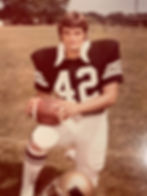Tough Coaching
- Rick Jones
- Sep 1, 2020
- 4 min read
Updated: Sep 2, 2020

I played football in a different time, a different era. While I didn’t travel to games with my helmet in my pocket in the back of a furniture truck like my Dad, things were definitely different. In my day, it wasn’t uncommon for a coach to grab my facemask and curse me out. I have also had my tail kicked by an unhappy coach for missing a block or a missing a tackle. Drinking water during practice was considered a weakness in my attainment of manhood. I will never forget my 9th grade coach chiding some of my weaker minded teammates who were caught sneaking ice during an August workout. “Men, if you’re thirsty, let me know and I’ll spit in your mouth.” My 7th grade coach got so frustrated at our jumping offsides, he took his “paddling board” to practice and lit us up every time we jumped offsides or committed what he call “stupid, dumb_ _ _ penalties. Building self-esteem did not appear to be one of these “old school coaches” major priorities.
While I had many great men to coach me along the way, I think one of the main reasons I became a football coach was to prove to some of my “bad” coaches, it didn’t have to be that way. Football (or any sport) is not easy. It is HARD. To be a great team and a great player is even HARDER. Sports demand toughness, period; however, how do we coach toughness the “right” way?
Here are a few thoughts about coaching TOUGH (on the field or in the office)

1. It takes effort and energy to confront. Coaches must do it tirelessly and consistently. In the football world today, Coach Saban and Coach Belichick are probably the best example of this. Some coaches will nitpick the third teamer to the point of brutality and turn their head when the same behavior is seen by the star player. Inconsistent approach to discipline and standards kills culture faster than anything. A coach can have everything going his way for years and one mistake, slip up, or lack of willingness to confront can destroy in seconds what was cultivated for years. TIRELESSLY AND CONSISTENTLY
2. Coaches must be tough enough to listen to other’s viewpoints. I know some great coaches that refuse to meet with parents concerning playing time. I have a process I have followed over the years in meeting with parents. Parents trust us with their most precious possessions in their life. We don’t have to change the depth chart, but we must have a process to listen.
3. What you allow is what you coach. Mike Leach, the head coach at Mississippi State, has a sign leading on to the practice field: “What you see on the practice field is what you coach or what you allow to happen.” Jumping offsides or dead ball penalties in practice, if not addressed, will happen when it counts most. We must be tough enough to look at our approach and methods with a critical eye. What we did in the past might work, but it also might not work. If we want our team to be tough, we have to be tough enough to adjust our methods and process when needed.

4. If I am tough enough to confront any behavior that hurts our culture, then everyone in the program will be tough enough to confront. If I am not tough enough to confront, then no one else will confront.
5. Tough coaches don’t say, “next play”, then keep harping about the last play. You can’t expect your team to focus on the next play if you are focusing on the last play.
6. Tough coaches set the example of toughness. They make tough decisions. They sometimes have to make people mad. They sometimes have to hurt player’s or fellow coach’s feelings, that is part of the job. A psychopath can make tough decisions, but a truly tough coach makes tough decisions painful to him even if he has a good heart for his players and coaches.

7. Tough coaches take all the blame and deflect all the praise. Bear Bryant after wins would always praise his coaches and players. After a loss, it was all his fault. I have never felt comfortable with praise because football is the ultimate team sport. Our success is the result of our coaches, players, trainers, parents, administrators, and community. When we lose, I let all of them down.
8. Tough coaches care enough about their players and assistant coaches to tell them the truth, good or bad. I appreciated my coaches who cared enough about me to tell me the truth of where I fell short and more importantly, how I can improve and get better.
Being a great leader is hard, that is why there are so few of them. The challenge for coaches/leaders today is to establish a system which builds toughness and grit without abuse and/or manipulation. How can we be demanding without being demeaning? The best answer to that question is from Buzz Williams, the men’s basketball coach at Texas A & M:
“I will always have the energy to hold you accountable to what you say you want to become and the path to what you want to become is not nearly as easy as you think it is.”